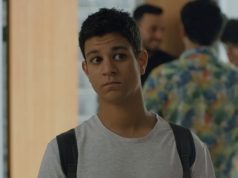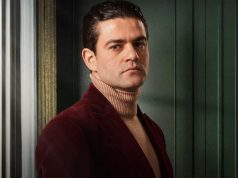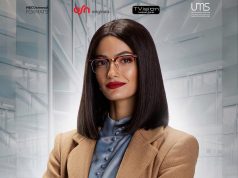Chatting with Multi-talented Hend Sabry
By Francesca Sullivan
Tunisian born actress Hend Sabry has become one of the Egypt’s biggest film stars, a serious dramatic actress who can also do comedy, a glamorous box-office draw with a long list of successful movies under her belt, but also a committed humanitarian and an Ambassador Against Hunger for the World Food Programme. As if this weren’t enough, she is a wife and mother with two small daughters. How does she juggle such a full life? Cairo West Magazine went to meet her on the set of her new TV series, Embratoreyet Meen?, which looks to offer a real treat for viewers this Ramadan.
CWM: What gave you the idea for Embratoreyet Meen?
H.S: I get sent a lot of scripts, but over the past two years so many of them have ignored the turmoil Egypt has been going through; I was looking for something I could relate to, something that would allow us to explore the changes that have taken place in the country. I came up with the idea for the series myself, gave it to script-writer Ghada Abdel-Al and she took it from there. I then collaborated with her and director Mariam Abou-Ouf in developing the characters. We all contributed so it was really a team effort. Taking a family who have been living the good life abroad (in this case, England) and bringing it back to Egypt because of home-sickness was a way for us to explore events we’ve all been going through. The characters think they will have a better chance of settling back home because of changes brought about by the revolution, but it turns out to be a culture shock.
Can you give us a few juicy snippets about the series?
Well it’s a satirical social comedy – you could almost call it a black comedy – not over-doing reality but talking about things that have happened to all of us, a timeline of real events that took place between January 2011 and June 2013, which is where it ends. The day of the first referendum, the Port Said football match disaster, sexual harassment in Tahrir Square, Morsi and Bassem Youssef, power cuts – these are just a few of the subjects that come into it; shared experiences that are all still fresh in everyone’s memory.
Turning tragic events into comedy is a skill. Ghada Abdel-Al has a really satirical way of looking at things, but for the director it’s walking a narrow line. Some things you have to stay away from, and we don’t feature too much death for obvious reasons. But there were some important subjects we did not shy away from, such as religious conflicts, and sexual harassment – in fact a whole episode was devoted to the sexual harassment issue. People always receive things better with a smile. They will consider things they wouldn’t otherwise have thought about as long as you don’t moralize.
By showing these things we hope it will give people a sense of unity through shared experiences. At the moment the country is so divided, and we won’t get far that way. We aim to unite our audience with humor, and remind them we are all in the same boat.
Are there moments in the series that you personally relate to?
All of them! The fear I felt for my kids during the uprising, the Maspero event, the Port Said killings – we were all scared and confused by what was going on. But that’s the nice thing about the series – everyone can personally relate.
Which genre are you more comfortable with, comedy or drama?
This is only the second time I’ve done comedy. The first time was in Aiza Atgawaz (I Want to Marry) and it was a hit. I’m the kind of actress who likes the challenge of juggling between drama and comedy and not being restricted – so fingers crossed this time around! I think comedy is more difficult than drama, and it needs to be daring enough to make people question different issues. For example in Aiza Atgawaz we looked at the way that being a single woman in our society is equated to not being worthy – and hopefully got people to think about and question that attitude. Only comedy can get a message across that quickly.
You are working with director Mariam Abou Ouf on two series for this Ramadan, it seems that you have a good rapport?
We are great friends, first and foremost, and have been ever since she worked as assistant director to Sherif Arafa on El Gezira (The Island), which I was starring in. She is super-talented, a workaholic, and we have the same creative vision; I believe in her. Also she has no ego-problems, which is a great plus for a director.
How do you still manage to find time for your work as World Food Programme Ambassador againstHunger?
I first began working with the WFP in 2008, when they approached me for a project in Gaza. At that time I didn’t yet have children, so I had a lot more free time in between film shooting. I did a year and a half without official ambassador status, and they saw how serious I was about the programme, so from then on they took my offer to use me for their promotional purposes; to raise awareness through my celebrity status. Nowadays they have to arrange my trips around my filming schedule, for example right after shooting this series I will be going to Syria. But it is important. Instead of using our celebrity to model dresses and sell ‘shiny’ things, we can use it to raise awareness of much darker issues, so why not?
Is it a challenge to manage family life and motherhood with your career? What tips would you give to working moms?
Now that I realize how hard it is, I would like to have some tips myself! But I would say avoid feeling guilty. When guilt sets in it can damage the time that you do have with your children. Make it quality when it can’t be quantity, otherwise your children will feel your guilt and it can damage both your relationship with them and your work.
The past three years have been particularly intense for me because of being a mother – I have two girls aged three and one. Fortunately I have a great support system with my mother and husband, but when I’m shooting a TV series in particular it’s hard. I basically shoot all day, go home, sleep, and do a shift with the children when I can.
What is the best advice you have ever received?
My mother has always been an inspiration to me, and she gave me this advice: that I can only ever rely on what I can do for myself, not what others can do for me. She taught me to be extremely independent, both emotionally and financially, and to take full responsibility for my own actions.
Quick Fire-round:
Favorite holiday location?
Any beach – but Tunisia is best!
Favorite cuisine?
Italian
Most recent book read?
Nineteen Eighty-four. It was previously missing from my ‘literary DNA’.
Tune on your mind these days?
It was ‘Happy’ for a while, but now I’m into the latest Coldplay album, which I love.
Favorite item of clothing?
Worst habit?
Being too harsh on myself.
Pet peeve?
Stupidity. I have a low tolerance threshold for stupid people!
Perfume?
It’s been the same since I was fourteen years old: White Musk from Bodyshop.
The most extravagant item you’ve ever bought?
A diamond solitaire ring from Mon Bousin. I got engaged to myself!
Guilty pleasure?
Eating pasta.
Success is….?
Being true to yourself in a way that transmits to others and makes them love you for who you are.
Are you an optimist or a pessimist?
Definitely a pessimist.
Beauty or brains?
I’d like to say beauty, but I have a soft spot for brains






Comments are closed.